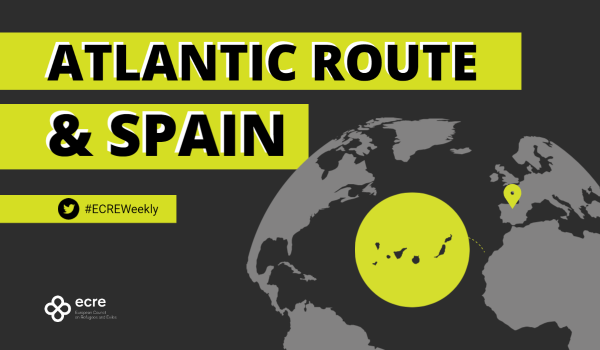- Nearly 12,000 migrants arrived in the Canary Islands in the first two months of 2024.
- The European Border and Coast Guard Agency (Frontex) has reported an increase in “criminal groups dedicated to human trafficking in Mauritania”.
- Presidential candidates in Senegal promise citizens more jobs to reduce departures from the country towards Europe.
- At least 20 people in Spain are under investigation for belonging to an organisation trafficking migrant corpses.
An increase in migrants’ departures, including unaccompanied minors, from Morocco towards Spain was noted in February. According to InfoMigrants, of the 60 people who arrived from Morocco, more than 20 were children. In mid-February, at least 57 minors took the same route. Mehdi Alioua, sociologist and professor at the International University of Rabat, in an interview with InfoMigrants said that there was a slight peak in arrivals, underlining that “there are always minors training to swim in the sea to one day leave.” He added that the militarisation of the border has made crossings more complicated, forcing Moroccans to find other and more dangerous ways to reach Spain. Commenting on the increased surveillance of the Moroccan coastline, Alioua called the surveillance, which is partly funded by the EU, “ineffective”. He added: “Europe always wants more coast guards and resources, but where will we stop? And who is going to pick fruit and vegetables in the summer in Spain if we refuse all the exiles? This is logic that doesn’t work”. Although March saw a decrease in arrivals to Spain, overall, numbers in 2024 are higher than in previous years. According to the Independent, migrant arrivals to Ceuta and Melilla by land have increased by 232% so far in 2024 compared to the same period in 2023, while the number of arrivals by sea has decreased – a result which Spain has linked to Morocco’s decision to deploy a permanent coastguard. Additionally, the Canary Islands route experienced a 630% increase in migrant arrivals. Nearly 12,000 migrants arrived in the Canary Islands between the start of the year and the end of February, according to official data from the Spanish Interior Ministry. Amidst ongoing tragedies – the latest was on 12 March, when seven people died in a shipwreck off the Canary Islands, the Spanish Prime Minister Pedro Sánchez praised the “extraordinarily positive” co-operation with Morocco. “We have established a cooperation that I would describe as exemplary. Our governments will continue to act in areas such as circular emigration”, Sánchez said (translated). Reacting to the Prime Minister’s statement, Helena Maleno, founder of NGO Caminando Fronteras, which reported the death of 6618 migrants trying to reach the Spanish coast, said: “We do not expect anything good for human rights from Sánchez’s visit because we have been settled for too long in bilateral relations based on blackmail and not on solidarity between peoples”.
The European Border and Coast Guard Agency (Frontex) has reported an increase in “criminal groups dedicated to human trafficking” in Mauritania who take advantage of sub-Saharan migrants’ demands to transition through their country in order to reach the Canary Islands. Sources in the occupied territories of Western Sahara told the Independent that the “same Moroccan mafias that operate on the Sahrawi coast have moved to Nouadhibou, the second city of Mauritania and bordering Western Sahara”. This has contributed to the signature of the €210 million “cash for migrant control” agreement between the EU and the Mauritanian government on 7 March. Meanwhile, ahead of the elections in Senegal, which are scheduled for 24 March, migration is one of the main topics shaping presidential campaigns. Reportedly, nearly 40,000 people, most of whom were Senegalese, risked their lives to reach the Canary Islands in 2023. Consequently, presidential candidates are promising citizens that they will create job opportunities to combat departures towards Europe. “The youth are not working and have nothing. The consequence is that they will die at sea,” said student Oumy Tall at a campaign rally for opposition candidate Anta Babacar.
At least 20 people are under investigation by the Spanish judiciary in the cities of Murcia, Alicante, Almería and Madrid, and four others were arrested on the weekend of 9-10 March for belonging to an organisation involved in the trafficking of migrant corpses. Reportedly, among those targeted by the courts were undertakers, forensic assistants and judicial administration staff working at the Institute of Forensic Medicine in Cartagena. Members of this network are accused of having asked for money, outside any legal framework, from families of Algerian exiles looking for their loved ones who had disappeared during the crossing the Mediterranean. InfoMigrants has reported that the existence of such networks might be related to the absence of clear and consistent protocols for searching for missing people and identifying people who have died on the migratory routes. “Unfortunately, States do not respect their obligation to search when the missing people are migrants,” said the NGO Caminando Fronteras.
For further information:
- ECRE, Atlantic Route and Spain: Ongoing Fatal Crossings – Spain and Frontex Renew Agreement After Temporary Suspension – Hundreds of Asylum Seekers Stuck in “Inhumane” Conditions for Weeks in Madrid Airport – Morocco Intensifies Efforts to Prevent Arrivals on Spanish Soil, February 2024
- ECRE, Atlantic Route and Spain: 2023 Marked as the Deadliest Year, Fatal Crossing Attempts, Rescue Efforts and Interceptions by Spain’s African Partners Continue, January 2024

